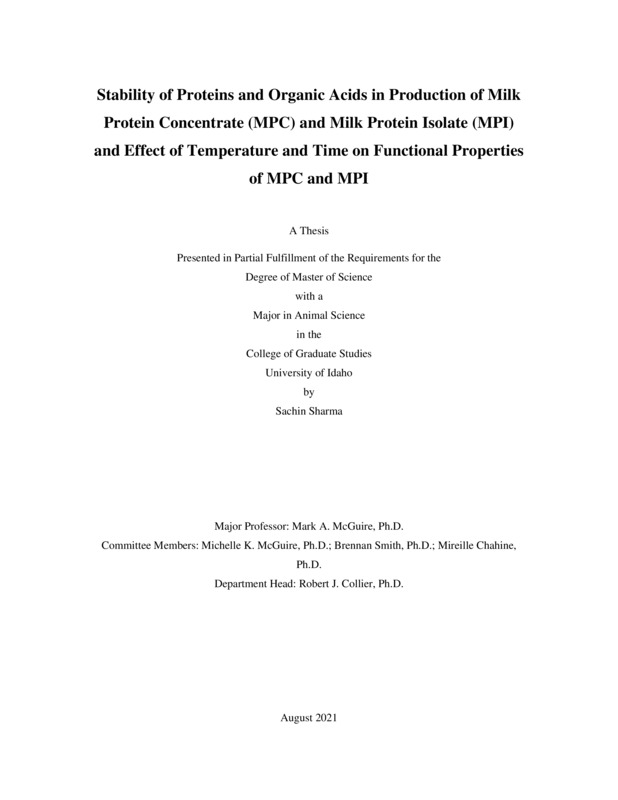Stability of Proteins and Organic Acids in Production of Milk Protein Concentrate (MPC) and Milk Protein Isolate (MPI) and Effect of Temperature and Time on Functional Properties of MPC and MPI
Sharma, Sachin. (2021-08). Stability of Proteins and Organic Acids in Production of Milk Protein Concentrate (MPC) and Milk Protein Isolate (MPI) and Effect of Temperature and Time on Functional Properties of MPC and MPI. Theses and Dissertations Collection, University of Idaho Library Digital Collections. https://www.lib.uidaho.edu/digital/etd/items/sharma_idaho_0089n_12085.html
- Title:
- Stability of Proteins and Organic Acids in Production of Milk Protein Concentrate (MPC) and Milk Protein Isolate (MPI) and Effect of Temperature and Time on Functional Properties of MPC and MPI
- Author:
- Sharma, Sachin
- Date:
- 2021-08
- Program:
- Animal and Veterinary Science
- Subject Category:
- Animal sciences
- Abstract:
-
Milk is a complex food containing many constituents in a variety of forms, like fat in an emulsion, proteins in colloidal dispersion, and lactose and minerals in a soluble phase. Each milk component has its own biological, nutritional, and technological significance. Milk is one of the most complete foods nutritionally being rich in protein, fat, carbohydrates, vitamins and minerals essential for sustaining life and maintaining good health. Milk proteins contribute to functional properties such as solubility, emulsion formation, and foaming ability and stability for products in food systems utilizing dairy ingredients. Processing such as heating and drying during production of milk protein concentrates (MPC) can affect milk proteins. MPCs have become common dairy ingredients because of their nutritional quality and functionality. A variety of organic acids (e.g., lactic, citric, and orotic) are also present in milk. Organic acids are important because they contribute to the flavor and aroma of dairy products. Organic acids are also used as additives to stabilize or increase the palatability of dairy products. Many organic acids in dairy products originate from the metabolism of larger organic compounds such as lipids, proteins, and carbohydrates. Stability of proteins and organic acids during production of MPC was evaluated. The quantity of various proteins and organic acids in raw milk, nanofiltration product (NF) and MPC-80 and milk protein isolate (MPI)-85 powder was analyzed by reverse phase-high performance liquid chromatography. MPC-80 is a specific dairy ingredient category containing 80% protein on “as is” basis while MPI-85 is another category containing 85% protein on a “dry matter” basis. Concentrations of the major caseins (α-CN and β-CN) were increased in NF compared to raw milk and further increased in MPC-80 and MPI-85. The concentration of κ-CN was greater in NF compared to raw milk but not different in MPC-80 or MPI-85. Most whey proteins (α-lactalbumin, β-lactoglobulin, IgM) were similar in concentration between raw milk and MPC-80 as well as between raw milk and MPI-85. The major caseins (α-CN and β-CN) were greater in concentration in MPI-85 than MPC-80.The effects of storage temperature and time on the solubility of MPC-80 and MPI-85 were investigated using solubility tests, emulsification, foaming ability and stability, viscosity and gelation time on powder stored at 25 ℃ and 55 ℃ for 49 d. Over time, storage at 55 ℃ compared to 25 ℃ reduced solubility of MPC-80 and MPI-85 but no difference was detected in solubility between MPC-80 and MPI-85. Emulsions made from either MPC-80 or MPI-85 stored at 25 °C had no visibly detectable separation or instability but emulsions stored at 55 °C had clear separation of cream and water with sedimentation of powder. Viscosity increased across all days of storage in MPC-80 and MPI-85 stored at 55 ℃ compared to that stored at 25 ℃. Foaming ability and stability of MPC-80 and MPI-85 were reduced during storage at 55 ℃, presumably due to the reduction in powder solubility. Gelation time increased in MPC-80 and MPI-85 stored at 55 ℃ compared to powder stored at 25 ℃. Overall, greater storage temperature adversely affected functionality of MPC-80 and MPI-85 with little difference between the milk powders. Preventing reductions in functionality of milk protein concentrates during storage at higher temperatures would likely aid in the economic value of these dairy ingredients. Key words: milk, milk protein concentrate, protein, organic acids, functionality
- Description:
- masters, M.S., Animal and Veterinary Science -- University of Idaho - College of Graduate Studies, 2021-08
- Major Professor:
- McGuire, Mark A
- Committee:
- McGuire, Michell K; Smith, Brennan; Chahine, Mireille
- Defense Date:
- 2021-08
- Identifier:
- Sharma_idaho_0089N_12085
- Type:
- Text
- Format Original:
- Format:
- application/pdf
- Rights:
- In Copyright - Educational Use Permitted. For more information, please contact University of Idaho Library Special Collections and Archives Department at libspec@uidaho.edu.
- Standardized Rights:
- http://rightsstatements.org/vocab/InC-EDU/1.0/

